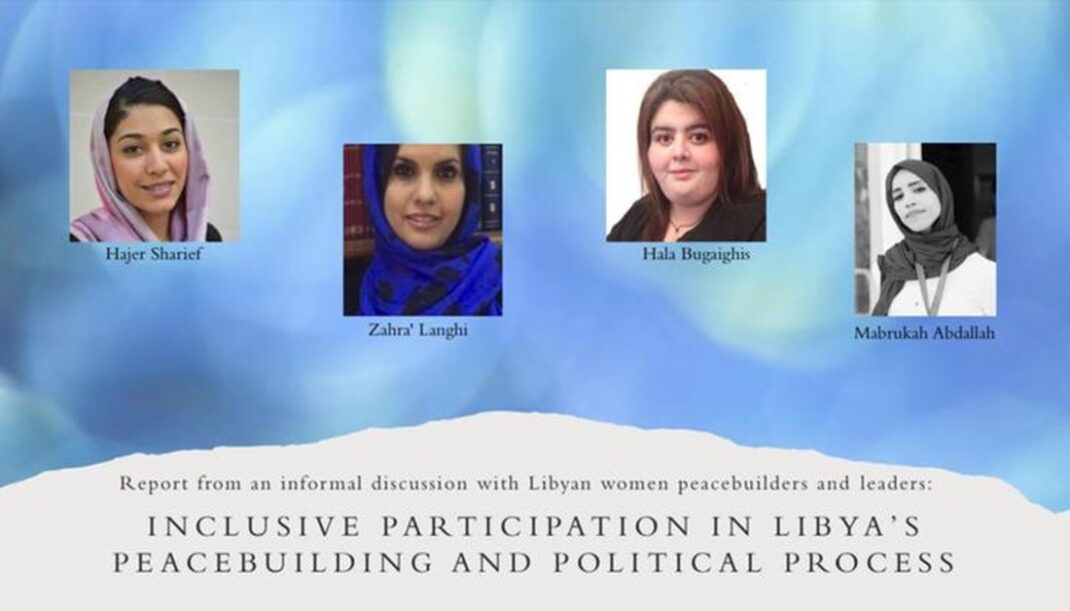Report from an informal discussion with Libyan women peacebuilders and leaders
 At the end of June, the Swedish Dialogue Institute for the Middle East and North Africa and the Swedish Permanent Representation to the EU hosted an informal discussion with Libyan women peacebuilders and leaders and senior officials from EU institutions and member states, on inclusive participation in Libya’s political process.
At the end of June, the Swedish Dialogue Institute for the Middle East and North Africa and the Swedish Permanent Representation to the EU hosted an informal discussion with Libyan women peacebuilders and leaders and senior officials from EU institutions and member states, on inclusive participation in Libya’s political process.
Summary
At the end of June, the Swedish Dialogue Institute for the Middle East and North Africa and the Swedish Permanent Representation to the EU hosted an informal discussion with Libyan women peacebuilders and leaders and senior officials from EU institutions and member states, on inclusive participation in Libya’s political process. The main recommendations from the meeting were:
- Timeline should be kept: election on 24 December. The choices are critical, despite the short time to prepare them. EU could play a role through election monitoring, advice and logistical support and by sanctioning possible political spoilers. Practical measures to improve security and counter hate speech online need to be identified.
- Stress on importance of an adapted legal framework to support the democratic process and the participation of women in Libya.
- Build on the progress made – women are more involved now than before and Libyan society is more accepting.
- Plans and tools to include women must be practical and feasible. Recommendation to the EU to integrate gender equality in all initiatives, rather than focusing on numbers (women representation does not automatically guarantee equality).
- The EU has an important role to play also in the critical period after the election: “This is when the real work begins. Election results need to be safe-guarded, respected, and managed. ”
At the end of June, the Swedish Dialogue Institute for the Middle East and North Africa and the Swedish Permanent Representation to the EU hosted an informal discussion with Libyan women peacebuilders and leaders.
The event, which was attended by EU senior officials from the EU institutions and member states, as well as UN officials, provided an opportunity for an informal exchange with prominent Libyan women regarding current political developments, in the wake of the upcoming national elections in December, and on prospects of contributing to inclusive participation and to the Women, Peace and Security (WPS) agenda.
- The panel of female peacebuilders and leaders consisted of: _ Mabrukah Abdallah (Founder of International Do Training & Development Center),
- Hala Bugaighis (Founder of Jusoor Center for Studies and Development),
- Zahra’ Langhi (Co-founder and Director of the Libyan Women’s Platform for Peace, member of the Libyan Political Dialogue Forum/LPDF) and
- Hajer Sharief (Human rights advocate and co-founder of “Together We Build It”).
Introductory remarks were provided by Mikael Lindvall (Swedish Ambassador to the Political and Security Committee) and the discussion was moderated by Charlotta Sparre (Ambassador and Director of the Swedish Dialogue Institute).
The panelists agreed that there has been real progress for women in the Libyan political process, with increasing participation in the recent municipal elections, when female candidates stood for office for the first time.
They also pointed to a small, but growing, understanding and acceptance in Libyan society, and from different civil society organizations, concerning women’s political engagement. The LPDF had decided that the current, interim, government should consist of 30% women. However, that did not happen as only 5 women are Ministers, but the sovereign Ministers of Justice and Foreign Affairs are women.
The speakers identified continued challenges preventing female progress in politics and on the WPS agenda, including hate speech online, security threats, inadequate legal protection for female candidates and their supporters, as well as, cultural norms still questioning female involvement in politics more broadly.
Stronger educational efforts were suggested as a useful method to increase the public’s acceptance of more female political candidates and representatives. Yet, in the current landscape, many women unfortunately don’t see any point in running for office since they feel that their chances of receiving votes are very limited.
One of the speakers stressed the need to gender mainstream also the Berlin process’ military track – the only track without women representation – as the ceasefire agreements governs hate speech crimes, safety during elections etc. All these elements must take women’s needs into consideration to ensure the success of the elections.
Zahra’ Langhi (LPDF member) provided an update on the ongoing negotiations on a new constitutional framework. The article providing for at least 30 per cent women in parliament is not seen as particularly contentious, whereas the eligibility of candidates with dual citizenship is proving more complicated to resolve.
The protection of minorities and vetting of candidates are other key questions on which to agree, with disagreements persisting on whether previous crimes, such as human rights violations and corruption, should disqualify candidates. The speakers expressed mixed feelings about the upcoming elections. On the one hand, the elections were deemed essential for the political process and for the country’s stability.
Civic space was also seen to have improved, incl. with more CSOs now advocating for inclusivity and for women’s rights and political and economic participation. As one panellist said, “We have a lot to learn, but this is a very promising development. If elections work out, I can see a civil country where our rights are protected, practiced, and allowed.”
On the other hand, the public remains worried about the elections and to some extent split in their views regarding the constitutional base for the elections. The lack of clarity about the process had created uncertainty. Another element mentioned was the tight timelines, given that the legal framework for the elections has not yet been established.
One positive trend, mentioned by the speakers, was the enthusiasm among youth, with record numbers of young people planning to run for office and support other candidates. However, this unfortunately includes very few young women, and there is also frustration regarding the fact that the existing legislation only allows people over 40 years of age to run for President.
The EU’s broad engagement and improved coordination on Libya was welcomed. Speakers appreciated the outcome of the Berlin process but called for measurable targets and the institutionalization of electoral laws.
Election monitoring was also requested, in addition to logistical support. It was emphasized that spoilers need to be held accountable, and that the EU should, as previously, take the lead by introducing sanctions and possibly freezing assets of relevant spoilers.
EU support for the proposed national reconciliation process, for instance by bringing together the relevant stakeholders, as well as a greater focus on economic issues, which are “connected to the daily lives of Libyans”, was also desired.
One speaker emphasized the need for support during the critical post-election period, during which the Libyan democratic transition has previously faltered: “This is when the real work begins. Election results need to be safe-guarded, respected, and managed.”
The international focus on quantitative targets for women was somewhat questioned, and one participant instead called for the EU to focus more on gender mainstreaming on all negotiation tracks and in all action plans. On the question of engaging men, or so-called “male champions”, in promoting greater gender equality ahead of the elections, the panellists expressed different views.
Whereas one speaker spoke in favour of running campaigns to involve more men – “since men can convince other men of the need for progress on gender issues” – another participant argued that Libyan men have a tendency to “allow” women to participate politically, which is the wrong starting point. “Our participation is a right not a gift.”
A third speaker stressed the holistic approach of the Women, Peace and Security agenda and the need to work not only on participation but on all four main pillars: Participation, Conflict Prevention, Protection and Relief and Recovery. She also argued for increased focus on accountability.
In light of low turnout in recent municipal elections, the speakers pointed to the importance of efforts to increase women’s participation and highlighted, among other things, the role of education in “normalizing” women’s participation in the political, economic and societal developments in Libya.
In conclusion, the panellists provided the following recommendations for the relevant Libyan authorities and for the EU and the international community’s support efforts:
- Ensure appropriate and relevant legal support and provisions, to safeguard democratic processes and women’s participation in Libya (one speaker was developing an index to help identify hate speech online, using words to which filters of the social media platforms don’t react).
- Enforce the law: “It is the highest power in the country. If the law is enforced, things will be much better.”
- Stick to the timetable and hold the elections in December. Not carrying through with elections was considered by one speaker to be “the worst possible scenario, which the Libyan people cannot afford.” Other speakers were more hesitant, given the short timeline but agreed that holding elections will be critical.
- Strengthen the educational system in support of female engagement more broadly in society and in politics.
- Introduce practical plans and measures to include women: “We need practical solutions that can be implemented. I am a ‘possibilist’ not a pessimist or an optimist.”
_____________
Swedish Dialogue Institute for the Middle East and North Africa




